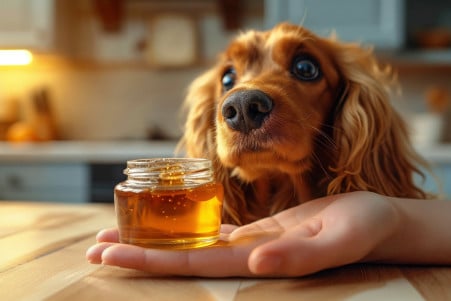Can Dogs Eat Syrup? Navigating Safe Sweet Treats for Your Pooch
10 February 2024 • Updated 9 February 2024

Syrup is one of those things that many people have in their homes, and yet it’s not always clear whether or not it’s safe to give to your dog. While natural maple syrup is safe for dogs to eat in small amounts, it’s not the healthiest option. Syrup is full of sugar, which can lead to a variety of health problems in dogs, including obesity and diabetes.
Plus, artificial syrups that are sweetened with xylitol are toxic to dogs, so you’ll want to make sure to keep those away from your pet.
In this article, we’ll take a deep dive into the world of veterinary nutrition research to find out what happens to dogs when they eat sugary things like syrup.
We’ll look at studies from veterinary nutritionists and toxicologists, as well as research on dog metabolism, to figure out what happens to dogs when they eat sweet things. By the time you’re done reading, you’ll be well-equipped to decide whether or not you want to give your dog a sweet treat like syrup.
Can dogs eat syrup?
Do Dogs Like Sweets? Can Dogs Taste Sugar?
Like humans, dogs have a taste system that allows them to detect a variety of flavors, including sweet tastes. This ability is why dogs are naturally attracted to sweet-tasting things like maple syrup, which is why your dog is so interested in your pancake breakfast, according to Hepper.
While treats are important for training and bonding, dogs’ nutritional needs are quite different from our own. Dogs require a diet that is high in protein, fat, and carbohydrates, as well as essential vitamins and minerals to support their overall health and energy levels.
Treats, even natural maple syrup, should be given in moderation. Because syrup is high in sugar, overfeeding it to your dog can lead to an unbalanced diet and potential health problems like obesity. According to Hepper, healthier treat options for dogs include peanut butter and fruit, which are more nutritious and less empty calories than syrup.
It’s important to make sure that dogs have a balanced diet that doesn’t allow treats to replace their regular meals or essential nutrients. Finding the right balance is important for your dog’s overall health and well-being, which is why it’s important to make sure that sweet treats are given in moderation.
The Bitter Truth: How Sugar Affects Dogs
Just as we are often cautioned about the dangers of sugar when we eat too many sweets, dogs are also at risk of developing certain health problems if they consume too much sugar. While sugar isn’t poisonous to dogs, according to PetMD, dogs can experience a range of issues from an upset stomach to obesity, metabolic changes, and in the most extreme cases, diabetes.
A study by Holiday Barn Pet Resorts even found that dogs can experience hormonal imbalances and tooth decay from eating too much sugar, showing that dogs’ bodies can have a negative reaction to a high-sugar diet.
Dogs can digest sugar, but not all sugars are created equal. While natural sugars found in fruits are better for dogs than processed sugars like syrups, which can cause a quick spike in blood sugar levels, leading to a range of metabolic problems including an increased risk of diabetes, as well as more immediate issues like hyperactivity and dental problems, according to PR Newswire.
One sugar substitute that’s especially dangerous for dogs is xylitol. According to both PetMD and Trupanion, xylitol is poisonous to dogs and can cause a quick drop in blood sugar levels, which can result in seizures and even death. With this in mind, while some sweet treats like fruit may be safe for dogs, it’s important to be careful and pay close attention to the ingredients in any sweet treats you give your dog.
Everything in Moderation: How to Introduce Syrup into Your Dog’s Diet Safely
If you’re thinking about giving your dog syrup, make sure to choose natural, pure maple syrup and use it in moderation. As the Fi Team explains, it’s important to make sure that syrup doesn’t replace regular meals or important nutrients.
Adding a small amount of syrup to your dog’s food every once in a while can be a fun way to mix things up, but make sure you’re always using organic syrup without any other ingredients or artificial sweeteners.
Make sure to read the label before giving your dog syrup. Both the Fi Team and DogTime warn against giving dogs syrup with harmful ingredients like xylitol, which can be fatal. Make sure to keep the serving size to a teaspoon for large dogs and half a teaspoon for smaller dogs and don’t give it to them more than once a week to avoid overconsumption and weight gain.
Keep a close eye on your dog after giving them syrup. DogTime recommends looking for signs of vomiting, weakness, or difficulty breathing, which could be signs of a reaction that requires immediate medical attention. By following these recommendations, you can make sure that syrup is a fun, occasional treat for your dog that doesn’t cause any harm.
Making It Work: Healthy Sugar Substitutes for Dogs
If you want to give your dog a sweet treat, you should look into natural sweeteners that are safe for dogs. Animal Wellness Magazine suggests raw honey and pure coconut sap or syrup as healthy alternatives that will give your dog the sweetness they crave without the dangers of refined sugar.
Honey, which is also known for its antibacterial properties, can help with digestion and allergies in dogs. Meanwhile, coconut syrup is full of vitamins and minerals and is a great option.
That said, it’s important to use these sweeteners in moderation since they are still high in calories. One great way to use them is to make your own dog treats, which will allow you to control the ingredients. A little bit of honey or coconut syrup can be added to a dog treat recipe to give it a little extra flavor and a nutritional boost.
It’s important to talk to your vet before you start using these sweeteners in your dog’s diet. Since every dog is different, it’s important to make sure that you’re making the best choices for your dog’s long-term health. A study published in the Journal of Animal Science in 2023 notes that diet has a significant impact on pet physiology and calls for personalized nutritional interventions based on individual health statuses.
How Dogs Digest Sugars and Sweeteners
The digestive system in dogs runs from the mouth to the large intestine, and each part of the system has a specific function in the breakdown of food, including sugars.
The Veterinary Teaching Hospital at Washington State University explains that the pancreas and liver are especially important in sugar digestion, and the enzymes in the saliva are the first to start breaking down carbohydrates.
A study in PMC explains that the differences in digestive physiology between dog breeds are due to selective breeding. These differences impact how dogs digest sugars, and the size of the dog impacts the presence and activity of gut microbiota, which in turn impacts sugar digestion.
Gut microbiota is important because it ferments sugars to create energy.
However, the Merck Veterinary Manual warns that a diet high in sugars can disrupt the balance of gut microbiota and lead to chronic metabolic diseases.
These diseases can include obesity, diabetes, and other metabolic disorders that can be detrimental to a dog’s well-being.
In Summary: Safe Syrup Snacks for Your Pup
So, the bottom line is that dogs can eat real maple syrup in small amounts. While dogs can taste sweet things, it’s important to remember that their nutritional needs are very different from ours. So, the same rules apply to syrup as a snack for dogs: everything in moderation and make sure you read the label. This is especially true when it comes to artificial sweeteners, with xylitol being the most dangerous for dogs.
By limiting the amount of syrup you give your dog, you can help prevent health problems like obesity and diabetes while still allowing them to enjoy a special treat. Just remember that treats should only make up a small portion of your dog’s diet. For those looking for other options, natural sweeteners like raw honey or coconut oil may be a safer bet, as long as they’re used in moderation.
Of course, it’s always important to talk to your vet before making any changes to your dog’s diet to make sure you’re not putting their health at risk.
After all, responsible pet parents are careful about the treats they give their dogs, making sure that every snack they eat helps contribute to their overall health. Let’s make sure we’re doing the same for our furry friends by making choices that will help them live long, happy lives.


